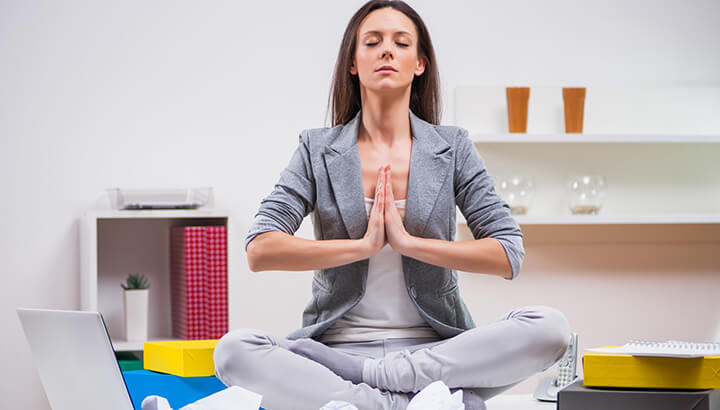Have you been thinking about trying meditation, but haven’t quite gotten around to starting yet? Maybe you got yourself all motivated to start… but then got distracted and busy with other things. It happens; life gets pretty crazy from time to time for all of us. However, meditation is something that is definitely worth your time and effort.
If you keep giving yourself excuses to put off meditation, you’re not alone. Here are seven common ones… and how to get past them.
“I don’t have enough time.”
I hear you on this, I really do. These days, most of us lead pretty crazy lives, and there isn’t exactly an abundance of free time on hand. However, meditation, if you commit to squeezing it into your schedule, can actually free up some of your time. How? When you relax your mind and shift your awareness to the present, you are able to move efficiently move between tasks. You’ll also spend less time worrying… you know, the kind of worrying that slows you down.
Even five minutes of meditation in the morning, and five minutes in the evening, can help a great deal. Add five minutes in the afternoon to get you through your workday, and you’re off to a great start. While you’re scheduling in the meditation, by the way, schedule yourself some free time as well. Even if it’s just an hour… you probably need it.
“I’m too tired.”
Whether you’re tired from an overbooked schedule, not enough sleep, or recovery from an exhausting endeavor, meditation may be able to help. As mentioned, fitting meditation into your busy schedule can help to center you, and perhaps give you some inspiration to schedule some time to get some much-needed rest. If you haven’t been sleeping enough, evening meditation is a great way to soothe your body and mind and get you ready for some quality Zs.
If you’re in recovery from an illness or a difficult period in your life, you may find meditation especially useful in healing. This ancient practice can be used as a tool to help you recover from various types of trauma; physical, mental, and emotional.
“I don’t know how.”
These days, it’s very easy to learn, if you make the decision to do so. The way that I learned, and the way that I recommend, is to find a guided meditation session in your area. There are many kinds to choose from, so do a bit of research and find a style that resounds with you. Many such sessions are free or donation-based, and you often don’t have to be a member of any organization to participate. If you’re not sure, all you need to do is ask.
If you don’t like the idea of group meditation sessions, there are plenty of video tutorials on YouTube on introductory meditation techniques. Simply search terms such as “beginner meditation,” and go from there. Ask friends you know who meditate for any particular videos (and other tools) they’ve found useful.
“I can never find a quiet enough place.”
This can be tough, especially if you live and work surrounded by noise (for example, loud, high strung children running around). However, even if you have to go into your backyard, or to a nearby park, to find some peace and quiet, do so. You could meditate while taking a bath, or even in the shower (the running water drowns out quite a bit of noise!). Get creative.
That said, you can’t expect everything to be completely quiet while you meditate. Sound is part of life, and part of meditation is to accept the sounds around you without getting distracted and vexed by them. The sounds simply are. If you can’t find a space that’s super-quiet, run with the noise. Treat sounds as you would your own running thoughts. Accept them, and let them go.
“I’m way too high strung for that.”
I have struggled with anxiety my entire life, so high strung is something I understand very well. However, meditation really helps with that. The more I meditate, the easier it becomes for me to unwind. It helps me to unspool that tightly wrapped wire of tension, if you will. It may help you, as well.
“I don’t want to do it alone.”
Well, there’s always guided meditation — perfect for people who prefer to meditate in the company of others. You could also buddy up with a friend and have meditation sessions together. Ultimately, though, meditation is something you do alone. Even if you’re in a group or with a friend, you meditate alone, in and with yourself. If you’re uncomfortable with that, rest assured that it gets easier with practice and time.
“I simply can’t bring myself to get started.”
It’s a cliche, but it’s a true cliche: taking the first step is the hardest. If you decide to do it today — just clear your mind of excuses and do it — it will be easier to meditate tomorrow. Then even easier the day after that. So, the sooner you begin, the sooner the hard part will be over.
What obstacles did you face when you started meditating? How did you overcome them?
— Meditation Daily







